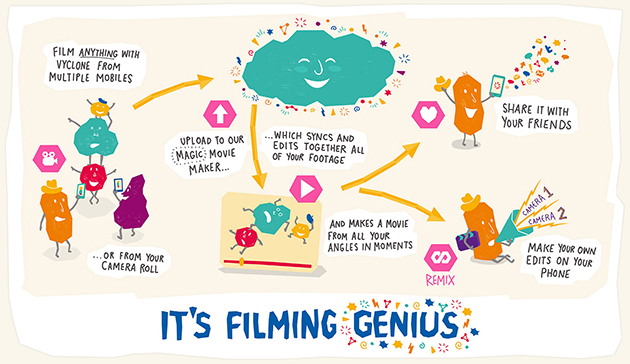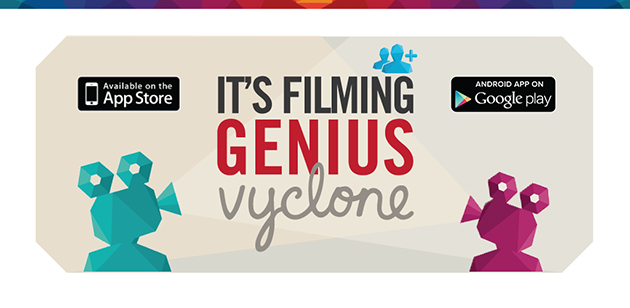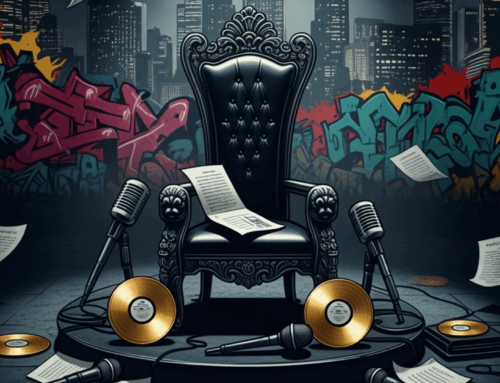 Remember when blogs and forums constituted most of social media? Moving from one trend to the next over the past decade, social media and video have intertwined on multiple occasions, and now are emerging as a single trend. Vine – recommended at a 2013 WMC panel as a social media tool – starts with six-second snippets – most notably used by DJ A-Trak to record part of Kanye West’s performance at the recent Met Gala. App developers are getting in on the action, and the latest to do so is Vyclone.
Remember when blogs and forums constituted most of social media? Moving from one trend to the next over the past decade, social media and video have intertwined on multiple occasions, and now are emerging as a single trend. Vine – recommended at a 2013 WMC panel as a social media tool – starts with six-second snippets – most notably used by DJ A-Trak to record part of Kanye West’s performance at the recent Met Gala. App developers are getting in on the action, and the latest to do so is Vyclone.
What makes Vyclone, developed by Sting’s son Joe Sumner, so unique is the multi-angle approach. Unlike the single-camera angle seen in countless YouTube footage of live shows, Vyclone merges up to four videos recorded through the app to create an accurately synched clip of a single moment from multiple perspectives.
While the app, named one of the best of its kind by TechCrunch, Apps Magazine, The Guardian, and Men’s Journal, could get lost in the sea of possibilities out there, Vyclone recently announced a partnership with Russian DJ Arty for his Memorial Day Las Vegas show at Marquee. Say what you want about Arty’s bland “Together We Are,” but the partnership has potential to take electronic dance music and social media’s relationship to another level.
Previously, we highlighted how social media made EDM the force it became in 2012: Easy, personalized access with DJs, platforms that create a window into each performer’s life, new tracks hit the web before they end up on iTunes or even Beatport, and word about a concert causes tickets to sell out even before the lineup is announced.
 But on a greater scale, Brandtology points out, video presents a clearer path to fame in the present than video does, and coupling this with social media’s propagation, it could be the next approach to getting an artist out there and building a fan base. Even when a traditional music video isn’t in the picture, parodies – think Psy’s “Gangnam Style,” Carly Rae Jepsen’s “Call Me Maybe,” and, in the EDM sphere, Baauer’s “Harlem Shake” – might even be more effective than the tracks themselves.
But on a greater scale, Brandtology points out, video presents a clearer path to fame in the present than video does, and coupling this with social media’s propagation, it could be the next approach to getting an artist out there and building a fan base. Even when a traditional music video isn’t in the picture, parodies – think Psy’s “Gangnam Style,” Carly Rae Jepsen’s “Call Me Maybe,” and, in the EDM sphere, Baauer’s “Harlem Shake” – might even be more effective than the tracks themselves.
While other programs, think iMovie, require you to edit, what makes Vyclone particularly boundary pushing is the sync feature, or the splicing together of the clips to create a “shared moment,” as the app calls it. According to Vyclone, all a group of users has to do is point their phones together at the same scene and upload it to the app’s Magic Movie Maker, and from there, Vyclone syncs the clips together. For a user’s own creativity, the raw footage is still available.
Adding to the social aspect is the network Vyclone creates. Users have the option to follow friends, celebrities, musicians, and anyone who puts a clip, and can search locally for other users going to or who have been to the same event. They further have the option of creating videos with others who were present at the event – even if the user knows the individual or not. The result is hundreds of configurations of video from the same event, like what can be found for Arty’s Marquee show.
The vibe of an electronic dance music show, Sumner thought, appeared like the perfect opportunity to show what Vyclone can do. “You’ve got the lights, you’ve got the DJ, you’ve got the dancing girls, but you’ve also got people just freaking out, being crazy in the crowd,” he said to the press. “Unless you have a camera crew of 50, you’re not really going to capture it.”
Arty echoed this statement in an interview with the Huffington Post. “What I personally love when seeing music live is experiencing it with other people and their energy,” he said. “This is what I want to capture for fans and with apps, cameras, phone featuring strongly in the way we get to see live music I think Vyclone is perfect to create this feeling of togetherness.”
As it’s practically a month from Memorial Day, the final product of Arty’s Marquee show is already up online, and we gave it a look. You can watch it for yourselves:
While the quality certainly doesn’t approach professional video, Vyclone has its advantages: One, the footage is visually clearer than typical smart phone-recorded footage; two, the multiple users capture the atmosphere of Marquee, from the crowd to the pool to Arty somewhat oblivious to it all; three, it makes creating a concert-themed video ridiculously easy. In fact, looking at the somewhat fuzzy, partially shaky footage, I was reminded of the Smashing Pumpkins’ 1994 concert video, Euphoria: the slickly jittery production, part of the highly-produced yet do-it-yourself perception of many 1990s videos and album covers, frequently panned out over the crowd and then back to the stage, never settling in one place for long.
Essentially, from the music video perspective, the ability to create a quick concert-themed video makes all the poor excuses in the realm of electronic music now seem pathetic. If fans can put together something that needs a bit polishing up (or that has close-to-1990s production value), actual directors have to try harder, instead of just shots of crowds and people dancing. If the internet was able to make physical forms of music close to obsolete, apps like this take the mystique out of creating a video.
 Vyclone, as well, continues the crowdsourcing trend, seen over the past few years with projects by Richard Durand and Avicii: Fans want to contribute, even if it’s just a snippet among thousands, and this particular social platform makes this incredibly easy. As DJs and producers get fans involved, be it a retweet or incorporating their music, Vyclone (and potentially similar apps that could follow) allows for a new dimension of contribution and closeness with an artist: Attend a show, bring a phone with the app, and have the DJ’s team incorporate it into an official video.
Vyclone, as well, continues the crowdsourcing trend, seen over the past few years with projects by Richard Durand and Avicii: Fans want to contribute, even if it’s just a snippet among thousands, and this particular social platform makes this incredibly easy. As DJs and producers get fans involved, be it a retweet or incorporating their music, Vyclone (and potentially similar apps that could follow) allows for a new dimension of contribution and closeness with an artist: Attend a show, bring a phone with the app, and have the DJ’s team incorporate it into an official video.
But, as many know, fan participation in music videos is hardly new. 1,600 people did it for Michael Jackson in 2011, and the Beastie Boys’ concert film Awesome; I F-ckin’ Shot That! is built entirely around this premise. Vyclone, really, cuts out all the extensive editing such projects require and makes formal and informal crowdsourcing something anyone with a phone, really, can do.
What’s your take on apps like Vyclone? Will they bring more fans together through video? Will it cause actual video directors to do something original?




